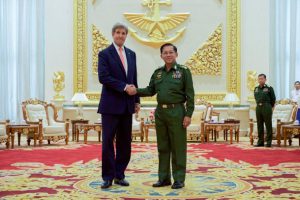Burma Government Must Heed US Stance on Rohingya
By Burma Partnership • May 24, 2016
With US sanctions on Burma being extended with amendments, and US Secretary of State, John Kerry paying a visit to the country, US policy on Burma has become clarified. It will continue to engage and support the country, especially in facilitating free markets and investment, yet reservations around the military’s role in the political domain, certain crony individuals and businesses, and the continued persecution of the Rohingya convey the message that support is not absolute, and more reforms need to take place.
On 17 May, 2016, US sanctions were extended by another 12 months with certain amendments. All banks in Burma have now been taken off the sanctions list, thus making it easier for US businesses to operate, yet certain individuals with close ties with the military and the former regime remain on the Specially Designated Nationals (SDN) list, thus barring any US businesses from dealing with them. The ban on businesses investing in jade and other precious stones remains. President Barack Obama, when notifying Congress, explained the reasoning behind the continued sanctions, “The political opening remains nascent, and concerns persist regarding ongoing conflict and human rights abuses in ethnic minority areas, particularly in Rakhine [Arakan] State, and the continued role of the military in the country’s political and economic activities.”
Following this announcement, US Secretary of State visited Burma on Sunday 22 May, 2016, meeting State Counselor, Daw Aung San Suu Kyi and the Commander-in-Chief of the Burma Army, Senior General Min Aung Hlaing. Referencing the sanctions he stated, “The key to the lifting of the [remaining] sanctions is really the progress that is made within Myanmar in continuing to move down the road of democratization…it is very difficult to complete that journey, in fact impossible to complete that journey, with the current Constitution.”
One of the key reforms that Burma must implement, as President Obama noted, is to end the persecution of the Rohingya that denies them citizenship, political rights, and restricts their movement. Violence in 2012 has left over 100,000 segregated in under-resourced camps, causing thousands to risk their lives by leaving en masse on rickety boats across the Bay of Bengal, many not making it to land alive. The plight of the Rohingya and the position of the US has come under scrutiny recently as ultranationalist monks have conducted protests against the US for their use of the term ‘Rohingya’ in a statement in April 2016 and continued use since then. They are now calling for the removal of US Ambassador, Scot Marciel. The Foreign Ministry, in a move that drew ire from the international media, responded to the initial protests by requesting that the US refrain from using the word, “Rohingya” as it could be too controversial. This was vehemently rejected by Rohingya civil society organizations, believing that “such actions of the government have, to all intents and purposes, encouraged the extreme racist nationalists.”
The denial of the Rohingya’s basic citizen rights by refuting the existence of the term ‘Rohingya’ contravenes Article 15(1) of the Universal Declaration of Human Rights, “Everyone has the right to a nationality.” While detractors may point to the term ‘Rohingya’ as a political construct, given that all ethnic and racial identities are a construct based on social, religious, cultural or political characteristics, this argument does not hold up in the face of internationally recognized human rights standards.
The NLD-led Government must take steps to allow the Rohingya their basic human rights, including their right to self-identify. As Wai Wai Nu, Rohingya activist and former political prisoner stated in an opinion piece in the Myanmar Times, “The first step is to allow us to join our brothers and sisters as equals, as human beings with the right to decide the name we think best reflects our culture and our history.” The US has shown that it remains committed to the democratization process in Burma, but further support for the Government, including the lifting of more sanctions, is contingent on the end to the persecution of the Rohingya. While it may not be a popular step in the face of an ultranationalist movement and widespread public disregard of the Rohingya, history will reflect badly on a Government that people place high expectations on regarding human rights if it does not end the discriminatory practices of successive military regimes.
Tags: 1982 Citizenship Law, Burma Partnership, Economy, Human Rights Violations, Muslims RohingyaThis post is in: Blog
Related PostsInternational Religious Freedom Report for 2015
International Law on Minorities’ Right to Self-Identify
Report of the United Nations High Commissioner for Human Rights: Situation of human rights of Rohingya Muslims and other minorities in Myanmar
NLD Government Must Protect Rohingya People
Open Letter on Amending the Peaceful Assembly and Peaceful Procession Act in Line with International Human Rights Law and Standards









 All posts
All posts